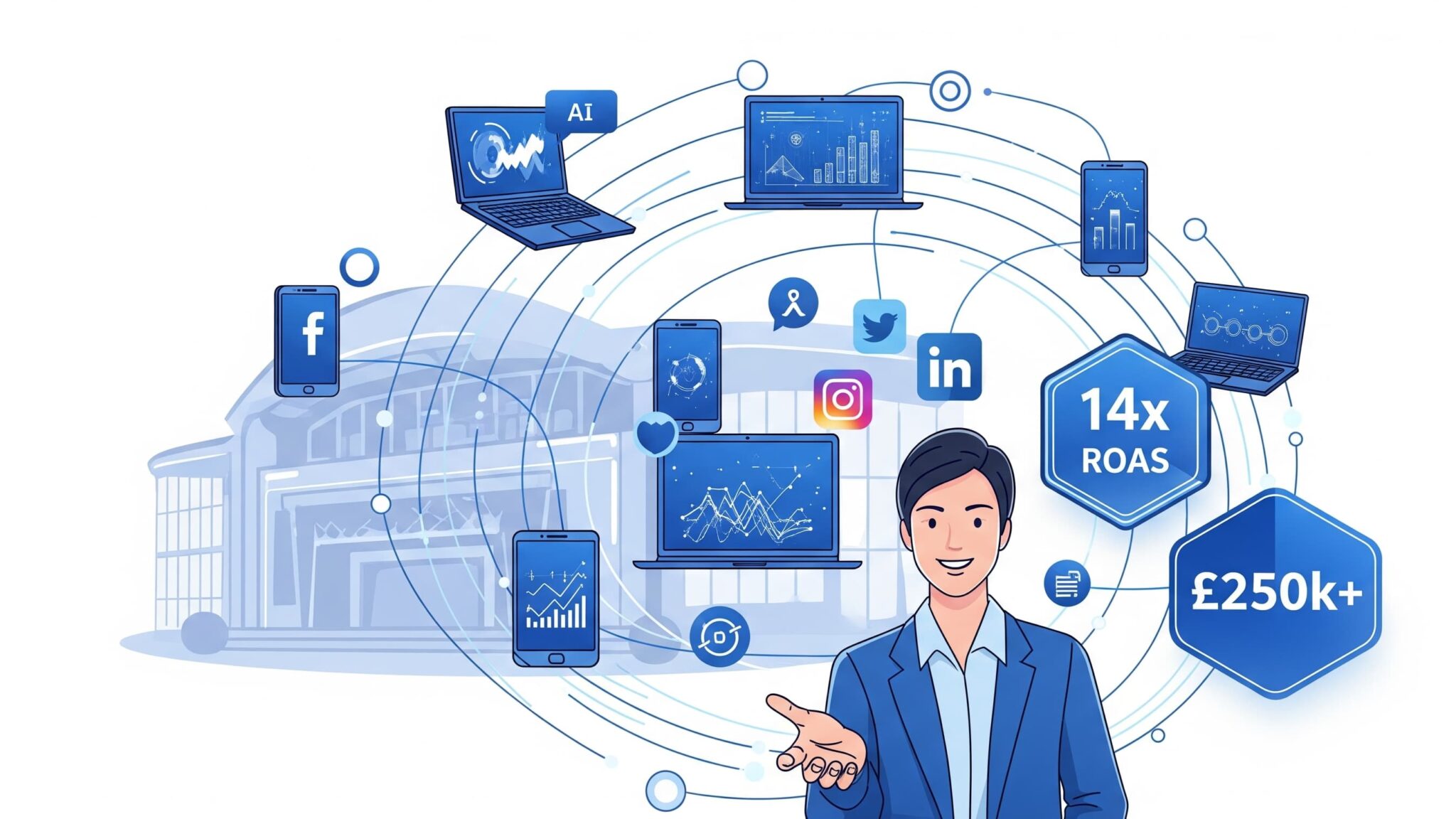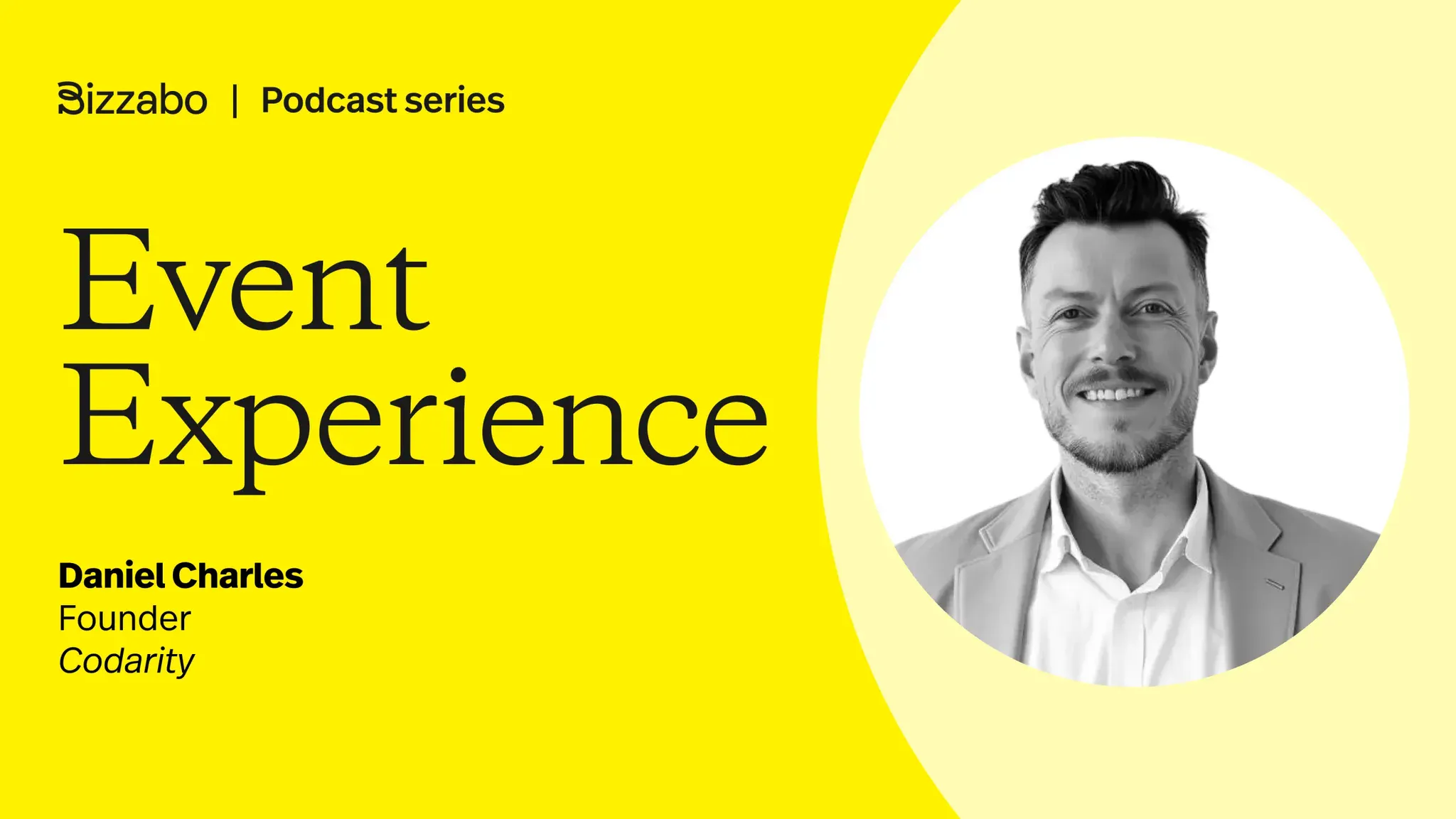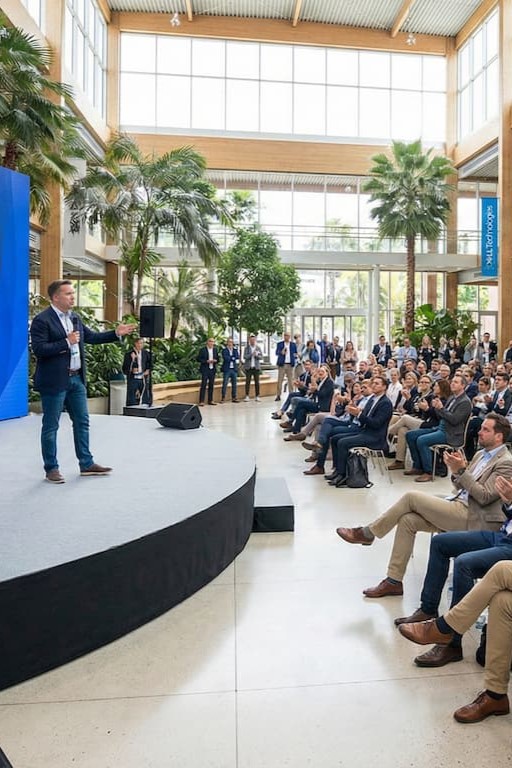Dan Charles
15/09/2025
Table of Contents

Key Takeaways
- 63% of event planners use AI tools, but most treat personalization as prettier creative instead of systematic business value delivery
- Event businesses stuck at £100k focus on memorable experiences alone, while £250k+ companies use strategic personalization to demonstrate clear ROI
- Converting event prospects requires 14.8 touchpoints—successful personalization works across the entire customer journey, not individual moments
- AI enhances human connection at scale when implemented strategically, positioning event businesses as ROI-focused partners rather than execution-only coordinators
The £100k Plateau Problem Meets the AI Reality
Your event business can create incredible experiences AND deliver measurable ROI through personalization. But if you’re approaching AI and personalization like most of the industry, that’s exactly why you’re stuck watching competitors win showcase projects while you compete on price.
Here’s what I see constantly: Event businesses think personalization means prettier creative or more “human touch” moments. They’re missing the strategic opportunity entirely.
The numbers tell a revealing story. While 63% of event planners are already using AI tools for event management, most are in early experimental stages. Yet industry leaders across multiple 2025 surveys agree on one thing: AI will fundamentally transform event planning and execution within 24 months.
The businesses that understand this transformation isn’t about replacing human connection—it’s about systematically delivering better human connection at scale—those are the ones breaking through the £100k plateau.
Why Most Event Businesses Get Personalization Backwards
The event industry’s obsession with “memorable experiences” has created a dangerous blind spot. Yes, memorable experiences are crucial—they’re also par for the course now.
Here’s the uncomfortable truth: With demand exploding year-over-year and competition fiercer than ever, memorable experiences alone won’t differentiate you. What separates the £100k businesses from the £250k+ breakthrough companies is how they use personalization to demonstrate clear business value, not just creative impact.
Most event businesses think personalization means:
- More creative touchpoints
- Warmer, more “human” interactions
- Customized aesthetic elements
- Personal service during events
The businesses scaling past £250k understand personalization means:
- Systematic data collection and application
- Targeted marketing that speaks to specific business outcomes
- Automated systems that enhance rather than replace human connection
- Measurable personalization that drives ROI
The Strategic Reality: Why AI Enhances Rather Than Replaces
I get it—many people feel burnt out with AI as a topic. The events industry especially prizes authentic human connection, and rightfully so. Events are inherently about community and bringing people together.
But here’s where most people miss the opportunity: AI doesn’t make events impersonal. When implemented strategically, it makes events more personal at scale.
Consider these applications:
- Personal Event Concierge: Attendees get AI-powered recommendations for exhibits, speakers, and networking opportunities based on their specific interests and goals
- Personalized Itineraries: Dynamic scheduling that adapts to individual preferences and business objectives
- Targeted Registration Flows: Onboarding experiences tailored to different attendee types and expected outcomes
- Real-Time Engagement: Contextual updates and opportunities delivered based on attendee behavior and stated preferences
The key insight? Users know they’re interacting with AI, but they appreciate the value it delivers. It’s not about hiding the technology—it’s about using technology to deliver better human experiences.
The Four-Step Framework for Strategic Event Personalization
After working with event businesses from 70-campaign chaos to 14x ROAS systematic growth, here’s the framework that actually works:
Step 1: Start Small with Strategic Segmentation
Don’t overwhelm yourself trying to personalize everything immediately. Begin with your CRM segmentation:
- Segment registrations and attendees into specific buckets based on business data
- Offer 1-2 personalized elements that align with each segment’s stated goals
- Focus on business outcomes, not just preferences
Step 2: Release in Measured Chunks
Scale thoughtfully to avoid creating poor experiences:
- Phase personalization features gradually
- Test with small groups before full rollout
- Monitor feedback and adjust before expanding
- Maintain quality standards as you scale
Step 3: Understand Deep Motivations
Go beyond surface preferences to understand why people attend:
- What business outcomes are they seeking?
- Why did they invest time away from their daily responsibilities?
- How do they measure success from event attendance?
- What would make this event worth their investment?
Step 4: Continuous Data Analysis and Application
Create systematic improvement cycles:
- Track engagement with personalized elements
- Measure business outcome correlations
- Apply insights to future events and marketing
- Build increasingly sophisticated personalization over time
The Data-Driven Business Case
The businesses implementing strategic personalization aren’t just creating better experiences—they’re generating better results.
Research shows that converting an event prospect takes an average of 14.8 touchpoints. Most event companies miss 70% of their marketing value by using last-touch attribution or no attribution tracking at all.
When we look at successful event business transformations, the pattern is consistent:
- Systematic lead generation replaces hope-based marketing
- Personalized targeting increases campaign ROI (like our client’s 14x ROAS achievement)
- Segmented approaches improve conversion rates throughout the funnel
- Data-driven personalization enables predictable scaling
The 50% of meeting planners already using AI for event planning and execution aren’t replacing human connection—they’re amplifying it through strategic personalization that delivers measurable business value.
What This Means for Your Event Business
The transformation happening in event marketing isn’t about choosing between human connection and technology. It’s about using technology to deliver better human connection at scale while demonstrating clear business value.
The event businesses breaking through the £100k plateau have made a fundamental shift: They use personalization to position themselves as strategic partners who happen to create amazing events, not event coordinators who sometimes think about business results.
When you combine creative excellence with systematic personalization focused on business outcomes, everything changes. Your clients stop shopping on price and start investing in partnerships that deliver measurable value alongside memorable experiences.
The question isn’t whether AI and personalization will transform event marketing—the data shows that transformation is already underway. The question is whether your business will lead that transformation or get left behind by it.
Your Next Step
The businesses that will thrive in the next 24 months are those implementing strategic personalization now, while their competitors are still debating whether to embrace these tools.
Start small. Focus on business outcomes. Use technology to enhance human connection rather than replace it. And always measure the impact on both experience quality and business results.
Because in an industry where memorable experiences are becoming table stakes, the real competitive advantage goes to those who can deliver memorable experiences that also drive measurable business value—at scale.
Ready to implement strategic personalization that delivers business results alongside memorable experiences? Discover how AI-powered systems can enhance human connection at scale while capturing every opportunity: Event AI Sales & Support Solutions

Behind the Podcast: What Event Businesses Really Need to Break the Feast-or-Famine Cycle

The Real AI Revolution in Events Isn’t What Cvent’s Selling

Why Your Event Business Doesn’t Need More Martech: It Needs a Coherent Message



